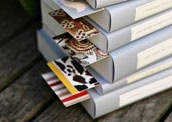- All our books
- Categories:
- Abroad
- Adultery
- America
- Architecture
- Biography
- Bloomsbury
- Childhood
- Cookery Books
- Country Life
- Diaries
- Education
- Family
- Fathers
- Gender and Race
- Grandmothers
- History
- House and Garden
- Humour
- Ireland
- London
- Love Story
- Men (books about)
- Men (books by)
- Mothers
- Poetry
- Politics
- Science Fiction
- Scotland
- Sex
- Shopping
- Short Stories
- Single Women
- Social Comedy
- Suffragettes
- Teenagers (books for)
- Thrillers
- Translations
- Victoriana
- Widows
- Woman and Home
- Women’s Place
- Working Women
- WWI
- WWII
- Young Love
- Persephone Merch.
- Audiobooks
- Book Tokens
- Notebook
- Persephone Classics
- Catalogue
Find a book

A Book a Month
We can send a book a month for six or twelve months - the perfect gift. More »
Order This Book

AFTERWORD BY NICOLA BEAUMAN
368pp
ISBN 9781903155950
This great classic of domestic literature initially appeared in weekly instalments in Time and Tide, the feminist weekly. Some might find it an oxymoron that a book is both domestic and feminist. But this is the central remit of Persephone Books and the reason why Diary of a Provincial Lady (1930) is a quintessential title for us; and why, although there are other editions in print (EM Delafield is now out of copyright) we felt we wanted it to join our list. An additional reason was that we knew our German printer, GGP, would make an excellent job out of reproducing Arthur Watts’s original illustrations. Most previous editions have ignored these, however we feel they are a crucial part of the fun.
For the Diary, which chronicles the day-to-day life of a wife and mother living in the country, is above all fun, in fact it is one of the funniest books ever written. And yet the humour is of a particular, Mr Pooter-ish type: an earlier EM Delafield novel had on its frontispiece a quote from The Diary of a Nobody: ‘I left the room with silent dignity, but caught my foot in the mat.’ We recommend it to any Persephone reader who loved, for example, Nancy Mitford's The Pursuit of Love because, as the Afterword to the Diary observes: ‘Self-deprecation of this kind is a particularly English occupation, one which foreigners find rather hard to understand. From Emma through Cranford, to The Diary of a Nobody, EF Benson’s Lucia books, 1066 and All That and Mrs Miniver, to name but a few of the links in the chain, they are all books in which the English laugh at their own peculiarities. They are also books which make light of the potentially grave and which subtly transform tragedy into pathos and pathos into humour.’ Which is why the trivial (bulbs) is so often bracketed with the serious (the war) as in the opening entry: ‘November 7th 1929 Lady B stays to tea. We talk some more about bulbs, the Dutch School of Painting, Our Vicar’s Wife, sciatica, and All Quiet on the Western Front.’
In 1931 the New York Herald Tribune called the Diary ‘a delicious book, a triumph of art and wit: EM Delafield is writing of a group and setting peculiarly English. What she has done is to extract from them the universals, the pure essence of comedy. She arouses the emotion of recognition in any one who has ever risen from hard-earned repose morning after morning to face the terrible trifles of the day.’ The (London) Times made the same point when it said that ‘she had an almost uncanny gift for converting the small and familiar dullnesses of everyday life into laughter’. India Knight once said that she ‘re-read for the nth time E M Delaifled’s dry, caustic Diary of a Provincial Lady and howled with laughter’. And Jilly Cooper wrote perceptively in the Guardian: ‘Gradually one realises that, despite the short sentences and the simplicity and unpretentiousness of the prose and subject matter, here is a very subtle and deliberate talent at work, naturally satirical, with a marvellous ear for dialogue and an unerringly accurate social sense.’
Also available as a (free) e-book.
Endpaper
Endpapers taken from the Harper & Brothers, New York cover for Diary of a Provincial Lady 1931
Read What Readers Say
Fleur Fisher
Northern Reader via Instagram
The Bibliophile’s Adventures Club
Categories: Humour Social Comedy
